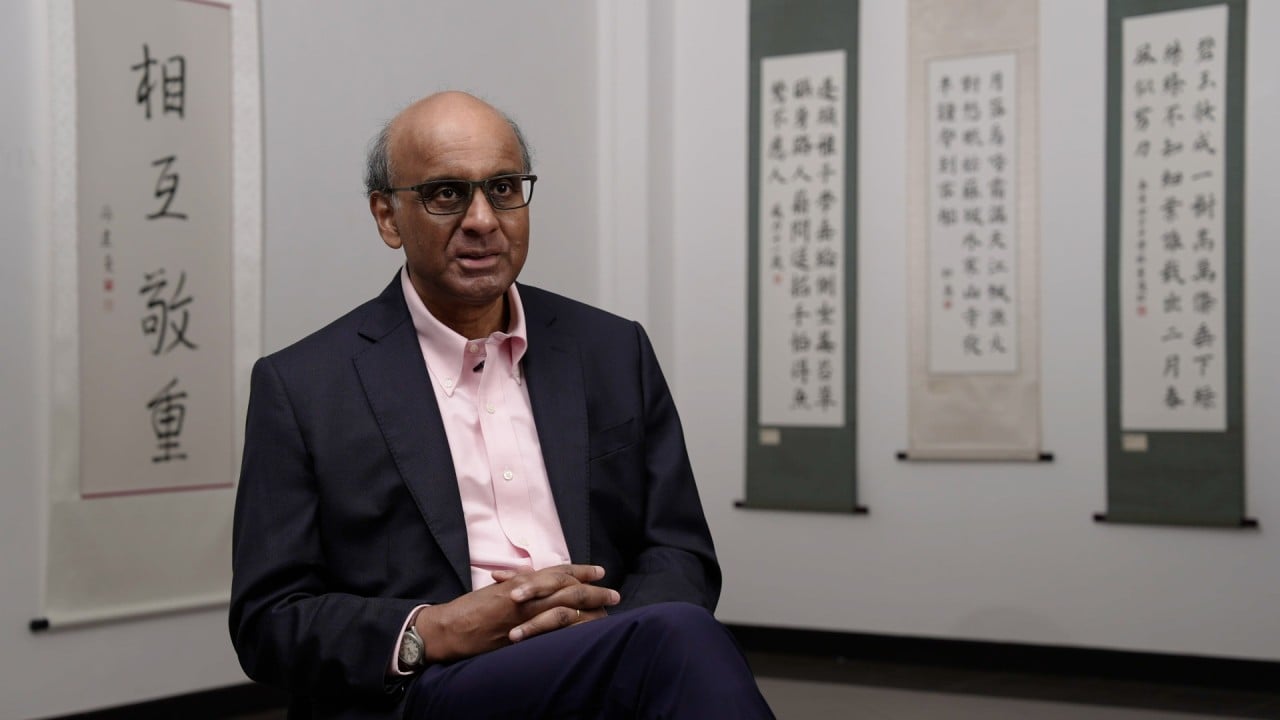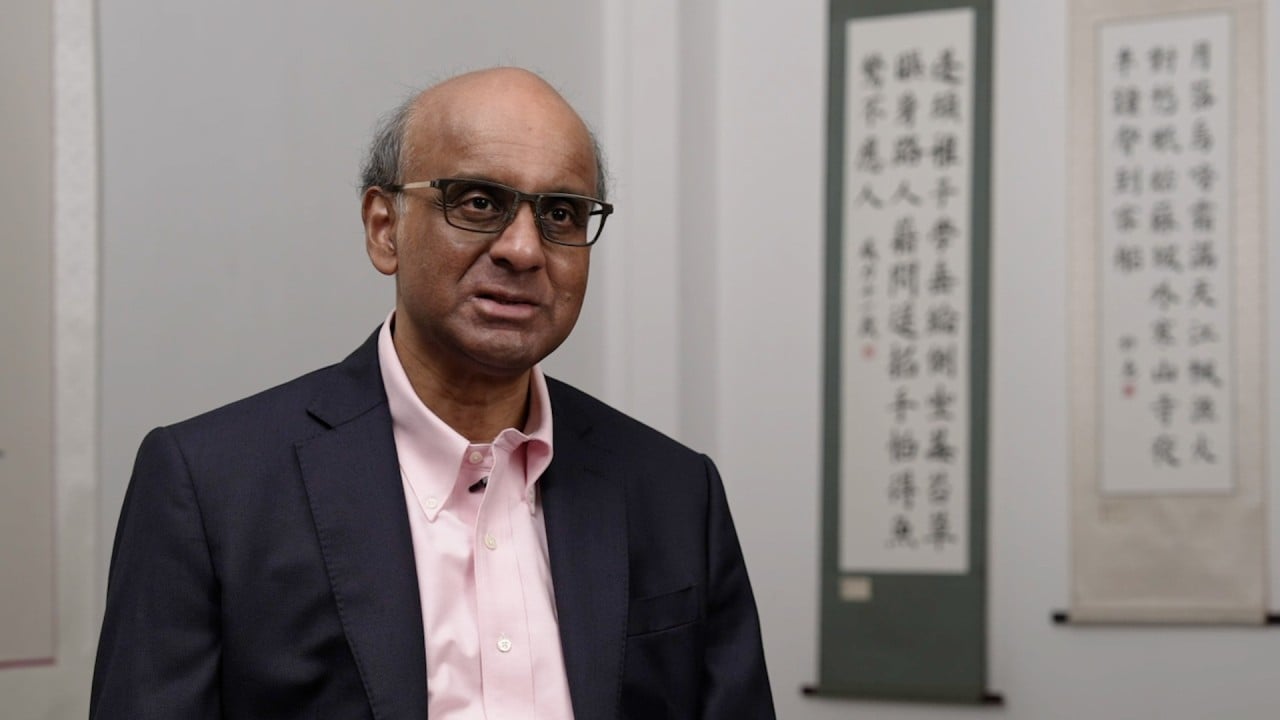
06:05
Singapore's presidential hopeful Tharman on how he sees the role of an independent president
Singapore’s president is not an alternative power centre and his job is not to ‘outshine the prime minister’, says Tharman Shanmugaratnam
- Tharman says the president must exercise his own judgment but it is ‘opportunistic’ to criticise presidential hopefuls for their past party ties, citing the late Ong Teng Cheong, who was ‘an independent president’
- The 66-year-old candidate says deputy prime minister Lawrence Wong is a ‘leader made for the times’, and that he knows the job of the president is not to be a ‘stand-out’
Singapore set for three-way presidential contest on September 1
At the same time, Tharman has tried to temper expectations among Singaporeans keen to see the directly elected president pushing back against the dominance of the PAP, which holds 80 out of 93 elected seats in parliament.
“The president is not an alternative power centre. He has to be very clear about that. You’re not there to be an alternative centre of political power and influence,” Tharman said. “If you want to be, you should stand for general elections. It’s as simple as that.”
In the last contested presidential election in 2011, the government’s pick, former cabinet minister Tony Tan, won but claimed only 35.2 per cent of the votes. The rest were split among three other candidates.
Singapore’s constitution already requires presidential candidates to resign from their political parties. Tharman said it was “simplistic” and “opportunistic” to criticise presidential hopefuls for their past party affiliations.
Singapore lucky to have Tharman and me running for president: Ng Kok Song
He cited the case of the late Ong Teng Cheong, who was the PAP’s chairman for 12 years and also served as deputy prime minister, before he stepped down to run for the presidency in 1991. Although he was the cabinet’s pick, Ong later clashed with the government, accusing officials of not being cooperative. “No one doubts he was an independent president,” Tharman noted.
Tharman also noted that critics did not seem to have a problem with Tan Cheng Bock, another former PAP politician who ran for president in 2011. He had positioned himself as opposed to PAP dominance. He lost to Tony Tan by fewer than 8,000 votes, with 34.85 per cent of the total.
In the same election, another candidate, former civil servant Tan Jee Say, was also regarded as an outsider candidate, securing 25.04 per cent of the vote. Without naming him, Tharman noted that “former principal private secretaries” to deputy prime ministers would also have to be ruled out if past government appointments were held against candidates.

Ruling out top officials in the public service who had served under the prime minister or his ministers would “weaken the system considerably”, he said.
He argued that it was wiser to look at the character, leadership experience and track record of the candidates.
“Past affiliations do sometimes create excessive loyalty, even slavish loyalty on the part of some people. These are the foot soldiers in history. They exist in every society. They come out of governments, they come out of political parties, they come out of the private sector, people who slavishly follow their former colleagues or bosses. Those are the foot soldiers,” he said.
“But we’re talking here about the presidency, about a leader. And we have to think about his character as a leader.”
I’ve absolutely no regrets of having served in the PAP government for the last 22-plus years on the ground
Among other things, Tharman was known for reforming education when he took over the portfolio in 2003, calling for a “teach less, learn more” approach and phasing out the streaming of students according to results.
Over the years, as finance minister and deputy prime minister, he played an instrumental role in the economic restructuring of the country and sweeping reforms of Singapore’s financial sector.
A Workfare scheme that paid low-wage workers a supplement to boost their incomes was among policies he became associated with that observers said reflected a more inclusive or left-leaning approach towards social policy.
“I don’t think anyone seriously doubts my independence of mind. It is an opportunistic argument. But I would say it is not just simplistic, but honestly, unwise for the long term,” he said. “Do not assume that the minister in a previous cabinet is going to be less independent than a senior public official, or anyone else.”
Tharman said his track record was an “open book” and even people in the opposition – some of whom had previously openly expressed the wish for him to join their ranks – knew his position.
“I’m non-partisan by character. And I’ve absolutely no regrets of having served in the PAP government for the last 22-plus years on the ground, working with people nationally, in helping to shift our policies in a direction which I felt was right, and internationally. I’ve no regrets at all.”
US should play China ‘long game’: Singapore’s Tharman Shanmugaratnam
Tharman had consistently been a top performer in general elections. In the 2020 polls, his team in the western suburb of Jurong received 74.62 per cent of the vote, compared with the PAP’s national vote share of 61.24 per cent.
Asked if he could face the brunt of public disgruntlement, Tharman replied that he did not think it would be a major factor as people’s concerns were being addressed.
“From time to time, it’s good to take a knock because there are lessons that come out of it. And there’s a reinforcing of the commitment to good governance and to having the right people. So I’m not too worried about that. I don’t think I’m taking a knock as a result of this.”

Tharman refused to be drawn into predicting how much of the vote he would secure, saying he never thought of targets, always preferring to focus on doing his best and not to be presumptuous about the outcome.
“There’s a broad middle ground whose support I would like to count on,” he said.
While some speculate that anti-PAP votes will drag down Tharman, a landslide victory may not be a total blessing for the government: it could raise expectations for the general election that the PAP may find hard to fulfil.
Singapore’s PAP draws line at corruption but not affairs, No 2 leader says
“And he was a very successful prime minister, over 14 years-plus successful domestically and internationally. But in his own words, it took him seven years before he felt he had emerged as a political leader in his own right, coming after a very strong founding prime minister,” Tharman said.
“And now you have the same with DPM Lawrence Wong. I’m convinced Lawrence will come into his own, with his own style, sometimes guitar in hand. He has a very different style. I know him well. I think he has what it takes. And he has a team that will gel and over time, of course, will be fortified with others. But it will be a strong 4G team made for the times, and I believe he’s the leader made for the times.”
Tharman noted that in the last several years, he had focused on helping to nurture the 4G leadership. “I know the role of the presidency is to add confidence and optimism in the Singapore system. That’s my role, not to become a stand-out. I’m very clear about that.”

A student activist who studied at the London School of Economics, and then at University of Cambridge and later Harvard, Tharman was also charged with breach of the Official Secrets Act in the 1990s when he was the government’s chief economist, a charge he has refuted to this day, saying “they got the wrong guy”.
During the interview, Tharman had on the wall behind him a piece of Chinese calligraphy he drew himself showing the 34 strokes of the message, “Respect for All”, which he has adopted as his campaign slogan. He has been learning the art form for the past two decades at the Singapore Centre for Calligraphy.
He wanted to develop a culture of respect for everyone regardless of their station in life, he said.
Tharman, a Ceylon Tamil, is up against two candidates from the majority Chinese community. In the past, government ministers had expressed doubts that enough Singaporeans would vote for a minority leader. The constitution was controversially amended in 2016 to reserve presidential elections periodically for minority candidates. Incumbent president Halimah Yacob, officially Malay, took office uncontested in 2017’s reserved election.
However, Tharman did not believe that his race would be a handicap in this election, given he is a known figure with a proven track record.
“Singaporeans are quite fair-minded. They look at your whole range of capabilities and track record. Race will never be absent in politics anywhere in the world,” he said. “But it is not the only factor. Your capabilities, the trust you have earned with people, your outreach, your rapport, all weigh heavily on people’s minds.”



